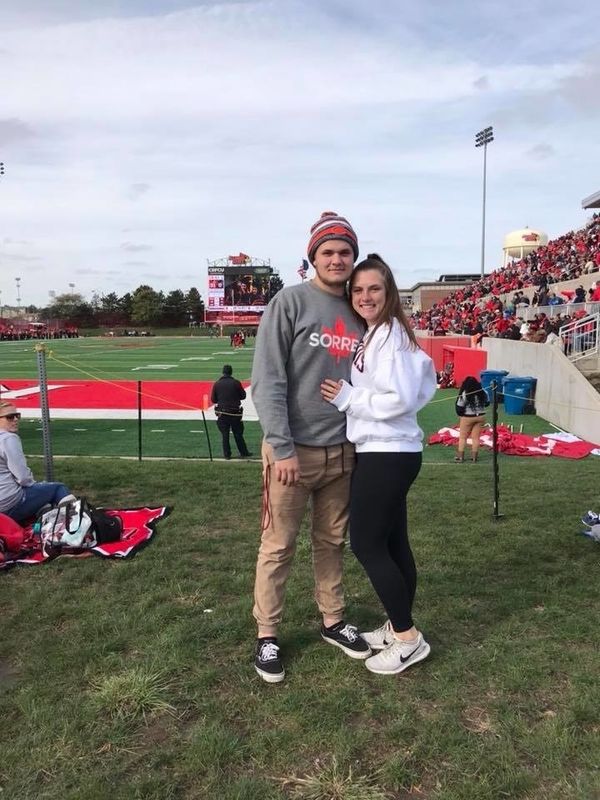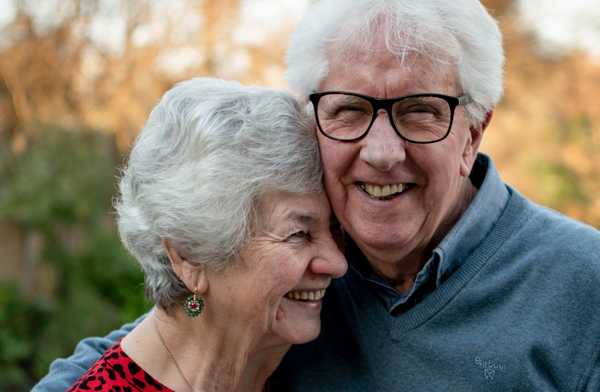As someone who struggles with depression, anxiety, and Post-Traumatic Stress Syndrome, finding ways to have healthy relationships has been difficult.
I wish there was a pamphlet I could hand out like: "Hey! I Want to Cry a Lot — Here's What to Do!" or "Snacks and Cigarettes: A Handbook for Taking Care of Your Depressed Girlfriend" or "Sometimes I Eat Cereal in the Shower — A Guide to Me."
Unfortunately, that's not a thing, and explaining myself to a new prospect is super intimidating. In trying to figure out what kind of girlfriend — and person — I want to be, I've learned some helpful tips along the way. Here are 5 ways to be a better partner to your girlfriend who's struggling with her mental health.
Be a lover and friend, not a therapist.
One of the things I've learned is people don't like to see depression. What this means is you might find yourself trying to "fix" the problem.
The issue is that you can't. Depression can't be fixed. Just because a relationship is good, does no mean the sadness will go away. We don't need someone to fix us, we need a friend. Just listen.
Be there. You don't need to walk around on eggshells or hold late-night counseling sessions (though you might need to host one every once in a while). Just be you, and be present. Depression sucks, but those of us who struggle with it are strong. Don't make a job out of us.
Remember fun things aren't always fun.
For example, I really love reading. But when's the last time I read a book for fun? Who knows, honestly. When you have depression, things you find enjoyment in sometimes might not feel fun at all. It feels like a chore.
Be willing to compromise. Be flexible. Try new things. Sometimes the thought of going out is incredibly overwhelming, and other times looking at the same four walls feels like being trapped in a cage.
Don't get upset when we don't want to go on an extravagant date the same day we had a bad episode. Don't get angry because tonight we don't want to grind on you at the club. Maybe next week.
Be proud of the "little" things.
Everything takes the energy we sometimes don't have. If you have a neurotypical brain a to-do list might be: wake up, get ready for work, go to work, eat dinner, clean up your apartment, go to sleep.
If you have depression your to-do list expands. Anything that requires energy goes on the list, so that six agenda day turns into: wake up, get out of bed, pick out clothes, get dressed, brush teeth, do makeup, eat something, get in car, go to work, get out of car, work for so many hours, go home... etc.
The same general tasks might have been done, but more things were put on the list to accomplish them.
If all I did today was get out of bed, get dressed, feed myself, shower, and do the dishes, that might be all I'm able to accomplish, but on a bad day that's a lot — especially when I spent an hour trying to convince myself that getting out of bed was a good idea. Be proud that we do what we can.
Be patient — especially about sleep.
The thing about depression is that it's exhausting. I'm always tired. Always.
When I go to bed at night, it might take me four hours to fall asleep because my brain is convinced I'll have nightmares or I'm thinking about something incessantly. But once I'm asleep, I'm ASLEEP.
My anxiety keeps me up, but my depression makes me exhausted. Don't laugh if we don't get out of bed at 2 p.m., or stay in bed all day to watch Netflix. We're tired. Nap dates are super underrated and very much appreciated.
Understand we want to give attention, but sometimes we can't.
Sometimes on a day when we don't have work or school, we want to be around you. We want to see you. But sometimes, even on a day off, we can't bring ourselves to do anything but eat pizza rolls in our underwear and take intermittent naps.
Please don't feel like we don't want to be around you, but when there are no responsibilities, we might want to relax our brains and bodies. Rest is important.
In the same vein, sometimes you might get left on read. We want to hear from you, but the energy to actually respond might not be there.
Anxiety might mean immediately jumping to a poor conclusion, and needing a second to actually understand your message before responding. Sometimes the idea of forming a small talk response just feels like... a lot. We'll get back to you. Be patient.
Overall, remember we do appreciate you being here, even when it's hard. Remember that even if we don't thank you enough. Being this kind of sad can feel super lonely.
Remember that you're dating a person, not a disease or disorder.
Go to Sonic late at night. Watch bad movies on Netflix. Swing at the park. Get a little lost in each other. Have inside jokes. Eat too much junk food. Kiss too often. Talk to your partner.
Being sad is hard, but being in love shouldn't be.
Follow Swoon on Instagram.
- 5 Tips For Dating Someone With A Mental Illness ›
- 7 Things You Should Know Before Dating A Girl With Body ... ›
- 10 Things to Understand Before Dating Someone With Depression ... ›
- Dating someone with depression can be tough—here are tips | Well ... ›
- 10 Tips for Dating With Depression - Health ›
- 5 Tips for Dating Someone Who Struggles With Depression ... ›
- Dating with Depression: Expert Tips to Help You Succeed ›
- Tips for Dating While Fighting Depression | HeadsUpGuys ›
- Dating Tips - Dating Advice for Women from Men ›
- Dating Advice For Men: The 15 Things You Must Never Do ›
- 6 Best Dating Tips That Will Completely Change Your Life ›






















